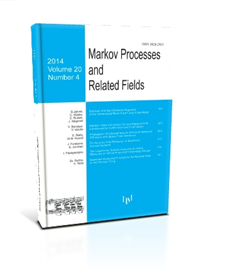Limit Theorem for Sums of Products of Random Variables,
A. Khorunzhy
2003, v.9, Issue 4, 675-686
ABSTRACT
We study asymptotic behavior of the sums $Z_{N,m}(\beta)$ determined by the formula $$ Z_{N,m}(\beta) = \sum_{i=1}^N \prod_{j=1}^{\lambda_i^{(m)}} \exp\{ \beta \eta_{i,j}\}, $$ where $\{\lambda_i^{(m)}\}$ and $\{\eta_{i,j}\}$ are jointly independent random variables such that their laws do not depend on the subscripts. We assume that $\lambda_i^{(m)}$ take values $ \{0,1,2,\dots\}$ and the mathematical expectations are ${\E} \lambda^{(m)} =m$ and $\E \eta = 0$. The random variable $f^{(\beta)}(N,m) = - (\beta m)^{-1} \log Z_{N,m}(\beta)$ can be regarded as the free energy of one more generalization of the Random Energy Model (REM) widely known in statistical mechanics. We prove existence of the limit $f^{(\beta)}(q)=\lim_{m\to\infty}f^{(\beta)}(N,m)$, $N = e^{qm}$ and obtain explicit expression for $f^{(\beta)}(q)$. We study properties of $f^{(\beta)}$ and compare our results with those obtained for REM and the Erd\H os\tire R'enyi limit theorem. Also the model with statistically dependent random variables $\{\l_i^{(m)}\}$ is discussed.
Keywords: Erdos - Renyi limit theorem,random energy model
COMMENTS
Please log in or register to leave a comment

